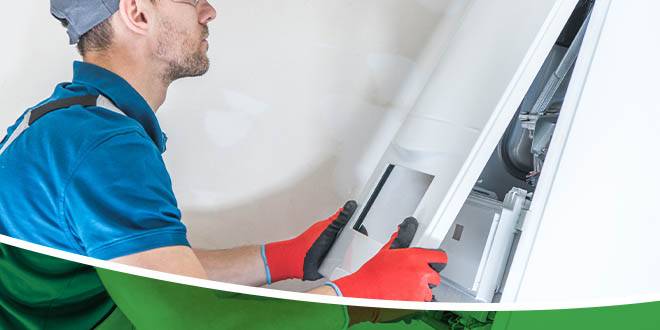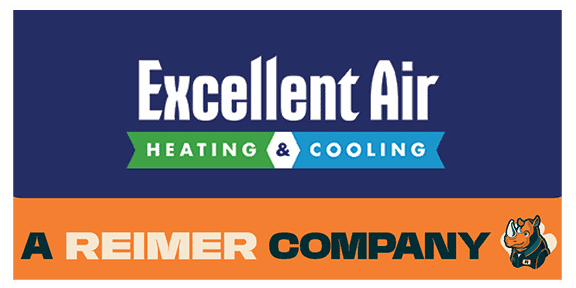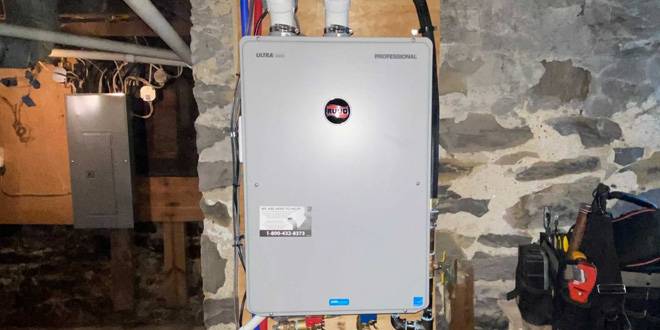Are you tired of running out of hot water in the middle of your shower? Do you want to save money on your energy bills while enjoying endless hot water? If you’re a homeowner in Rochester, NY, a tankless water heater might be the perfect solution for you! In this comprehensive guide, we’ll cover everything you need to know about tankless heaters, from how they work to the benefits they offer. Say goodbye to cold showers and hello to endless hot water!
Chapter 1: Understanding Tankless Water Heaters
Tankless water heaters (TWH), also known as on-demand water heaters, are a modern alternative to traditional tank-style water heaters. Unlike traditional tank water heaters that continuously heat and store water in a tank, tankless water heaters heat water only when you need it, eliminating the need for a storage tank. This means you’ll never run out of hot water, no matter how many showers you take in a row!

Chapter 2: How Do Tankless Water Heaters Work?
They work by heating water directly without the use of a storage tank. This means that they heat water only when you need it, eliminating the energy losses associated with storing hot water in a tank. Here’s a more detailed explanation of how tankless water heaters work:
Cold Water Inlet:
When you turn on a hot water tap, cold water enters the tankless water heater through a pipe connected to the unit.
Flow Sensor:
As water flows through the unit, a flow sensor detects the water flow and activates the heating elements.
Heat Exchanger:
The heating elements, usually high-powered burners, heat the water as it passes through a heat exchanger. The heat exchanger is a copper or stainless steel component that transfers heat from the burners to the water.
Temperature Control:
A control panel allows you to set the desired temperature of the hot water. The unit adjusts the amount of heat applied to the water based on your temperature settings.
Hot Water Outlet:
Once the water reaches the set temperature, it exits the tankless water heater and flows out of the faucet, providing you with instant hot water.
Continuous Flow:
TWHs can provide a continuous flow of hot water as long as there is a demand for it. This means you’ll never run out of hot water, unlike traditional tank-style water heaters that can deplete their hot water supply.
Chapter 3: The Benefits of Tankless Water Heaters

TWHs offer several benefits over traditional tank-style water heaters. Here’s a detailed look at the advantages of choosing a tankless water heater for your home:
Endless Hot Water:
One of the most significant advantages of a TWH is that it provides endless hot water. Unlike traditional water heaters that store a limited amount of hot water in a tank, a tankless water heater heats water on demand. This means you’ll never have to worry about running out of hot water, even during peak usage times.
Energy Efficiency:
TWHs are more energy-efficient than traditional tank-style water heaters. Because they only heat water when you need it, they eliminate the energy losses associated with keeping a large volume of water hot in a storage tank. This can result in significant savings on your energy bills over time.
Space Savings:
TWHs are much smaller than traditional water heaters, allowing you to save valuable space in your home. Tankless water heaters can be mounted on the wall, freeing up floor space that would otherwise be taken up by a bulky storage tank.
Longevity:
TWHs typically last longer than traditional water heaters. While traditional water heaters have an average lifespan of 10-15 years, tankless water heaters can last up to 20 years with proper maintenance. This can save you money in the long run, as you won’t have to replace your water heater as often.
Environmental Impact:
Because TWHs are more energy-efficient than traditional water heaters, they have a lower environmental impact. By reducing your energy consumption, you can help reduce greenhouse gas emissions and lessen your overall carbon footprint. Less energy used means more money being saved.
In conclusion, TWHs offer several benefits, including endless hot water, energy efficiency, space savings, longevity, and environmental friendliness. If you’re looking to upgrade your water heater, consider installing a tankless water heater for these and other advantages.
Chapter 4: Types of Tankless Water Heaters
TWHs are available in two main types: gas-fired and electric. Each type has its own advantages and considerations, so it’s essential to understand the differences between them before making a decision.
- Gas-Fired Tankless Water Heaters:
How They Work: Gas-fired TWHs use a burner fueled by natural gas or propane to heat water as it passes through a heat exchanger.
Advantages: Gas-fired TWHs typically have a higher flow rate than electric models, making them ideal for larger households with higher hot water demands.
Considerations: Installation of a gas-fired TWH requires proper venting to remove combustion gasses. This may require additional installation costs and considerations.
- Electric Tankless Water Heaters:
How They Work: Electric tankless water heaters use electrical heating elements to heat water as it flows through the unit.
Advantages: Electric tankless water heaters are smaller and more compact than gas-fired models, making them suitable for smaller homes or apartments where space is limited.
Considerations: Electric tankless water heaters may have a lower flow rate than gas-fired models, so they may not be suitable for households with high hot water demands. Additionally, they may require a significant amount of electricity to operate, which can lead to higher energy costs.
Important Parts of a Tankless Water Heater:
Heat Exchanger:
The heat exchanger is the component that transfers heat from the heating elements (gas burner or electric heating elements) to the water.
Flow Sensor:
The flow sensor detects when hot water is needed and activates the heating elements to heat the water as it flows through the unit.
Temperature Control:
The temperature control allows you to set the desired temperature of the hot water.
Safety Features:
Tankless water heaters are equipped with safety features such as temperature and pressure relief valves to prevent overheating and excessive pressure buildup.
Venting System (Gas-Fired Models):
Gas-fired tankless water heaters require a venting system to remove combustion gasses safely.
Chapter 5: Choosing the Right Size Tankless Water Heater

Choosing the right size tankless water heater is crucial to ensure that you have enough hot water to meet your household’s needs. Here’s how to determine the right size unit for your home:
Estimate Your Hot Water Needs: Start by estimating your household’s peak hot water demand. Consider the number of bathrooms in your home, the number of people living in your household, and the hot water usage of your appliances (such as washing machines and dishwashers).
Calculate the Flow Rate: Determine the flow rate of each hot water fixture in your home. This is typically measured in gallons per minute (GPM). Add up the flow rates of all fixtures that may be used simultaneously to get your peak hot water demand.
Select a Unit with Sufficient Capacity: Choose a tankless water heater with a flow rate that meets or exceeds your peak hot water demand. It’s better to slightly oversize the unit to ensure that you have enough hot water during peak usage times.
Consider Temperature Rise: The temperature rise is the difference between the incoming cold water temperature and the desired hot water temperature. The higher the temperature rises, the lower the flow rate of hot water the unit can deliver. If you live in a colder climate, you may need a unit with a higher temperature rise.
Consult with a Professional: It’s best to consult with a professional HVAC technician to determine the right size tankless water heater for your home. They can perform a detailed analysis of your hot water usage and recommend the right unit for your needs.
Chapter 6: Installation and Maintenance
Installing a tankless water heater is a job best left to the professionals. Here’s a detailed look at what’s involved in tankless water heater maintenance and installation:
Professional Installation: Tankless water heaters require careful installation to ensure proper operation and safety. A professional HVAC technician will assess your home’s hot water needs, recommend the right size unit, and install it according to manufacturer specifications. Proper installation is crucial for efficient and safe operation.
Venting Requirements: Gas-fired tankless water heaters require proper venting to remove combustion gasses safely. The venting system must be installed correctly to prevent the buildup of carbon monoxide and ensure proper air circulation.
Electrical Considerations: Electric tankless water heaters require a dedicated electrical circuit with the appropriate voltage and amperage. A professional electrician will ensure that the electrical system meets the requirements of the unit and is installed safely.
Water and Gas Connections: Proper connections to the water supply and gas line are essential for the safe and efficient operation of a tankless water heater. A professional installer will ensure that these connections are made correctly and according to local building codes.
Regular Maintenance: Regular maintenance is crucial to keep your tankless water heater running efficiently. Follow the manufacturer’s guidelines for maintenance, which may include flushing the unit to remove mineral deposits and checking for leaks or other issues. Regular maintenance can prolong the lifespan of your tankless water heater and ensure that it operates safely and efficiently.
Professional Service: If you encounter any issues with your tankless water heater, it’s essential to contact a professional HVAC technician for service. Attempting to repair the unit yourself can be dangerous and may void the warranty. A professional can diagnose and repair any issues safely and effectively.
Chapter 7: Financing Options
Tankless water heaters are an investment in your home’s comfort and efficiency. Fortunately, Excellent Air Heating & Cooling offers financing options through Synchrony and Reliant Credit Union to help make your purchase more manageable. Contact us today to learn more about our financing options and schedule your tankless water heater installation!
With a tankless water heater from Excellent Air Heating & Cooling, you can enjoy endless hot water, energy savings, and space efficiency. Don’t settle for cold showers – upgrade to a tankless water heater today! Contact us to schedule your installation of a tankless water heater in your Rochester, NY home.

Enjoy the Many Benefits of Going Tankless!
Upgrade to a tankless water heater with Excellent Air Heating & Cooling and say goodbye to cold showers forever! 🚿 Contact us today for a free consultation and learn how you can save money and enjoy endless hot water with a tankless water heater.




